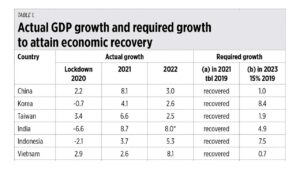When a company is ghosted by applicants

Many of our job vacancies can’t be filled because applicants who agree to come in for an interview are ghosting us. What’s happening? — Rain Drop.
There are many reasons why applicants ghost recruitment managers. The most common reasons, according to Justin Lowe, include the following:
One, applicants are selecting from multiple lucrative job offers and may have already chosen one.
Two, personal emergencies prevent them from going forward with the interview.
Three, they are unprofessional and believe that ghosting will not hurt their career.
Four, they feel they’re not good communicators who might not do well in an interview, and are expressing it through self-rejection.
Fifth, ghosting is normal for the younger generations. Boomers, for instance, did it too, except those cases tended to be a lack of technology to communicate with a prospective employer in the event of emergencies.
Today there is no cogent reason to miss out on an interview. In addition to Lowe’s explanations, I also find the candidate’s ego to be boosted by follow-up text messages or calls offering to re-schedule the interview.
Some young people can get a certain “high” for the resulting attention they receive.
Whatever the reason, I find it improper for job applicants to not honor an interview appointment. The only acceptable reason for me is illness, a vehicular accident or an emergency of equivalent severity.
MANPOWER PLANNINGWhen I was looking for jobs decades back, I took every opportunity to honor all interview appointments. Back then I received word of my job interviews via telegram by companies like PT&T and RCPI. Of more recent vintage are messages from potential employers sent via my trusty Motorola pager. Sometimes I accepted invites for the wrong reasons.
My intention was to practice answering all IQ tests and rehearse my replies to killer interview questions hurled at me along the way. That built my confidence. I say I accepted interviews for the wrong reasons because I was gainfully employed at the time, even at 19.
What’s the solution to your problem? Accept ghosting as part of the risk of offering employment. Shrug it off. You can’t control everything. Be proactive by focusing on what you can do to fill all the vacancies or prevent them from happening with the following approaches:
One, establish a dynamic manpower plan. This is the first step in getting the right people, at the right time and in the right place. The plan must be linked with an organization’s business forecast. When your organization has a plan for its operations for the current year and beyond, you can identify its manpower needs for the short and long term.
It will require an honest self-assessment of staff strengths and weaknesses to allow identification of jobs that can be outsourced to temps or project workers.
Two, analyze all factors affecting future demand. What are the plans for expansion? What new products or services are expected for launched in several months? How about the competition? What are the prospects for a merger or buyout to achieve economies of scale?
Is a new technology that promises to reduce manpower requirements? How many workers are due to retire in the next few years? Who are the workers receiving red circle pay, and who are currently above their pay scale and yet doing the job of lower-ranking personnel?
Three, consider all internal supply considerations. This means having a dynamic succession plan based on promoting from within. If no one can step up in an emergency vacancy, then your organization is in deep trouble. Hiring an external candidate can be demotivating to the current workforce.
It’s best to have an apprenticeship program to identify potential candidates if the work is complex and can’t be learned within six months. You can sometimes get by rely on casuals, temps or project workers as a stopgap while they acquire special skills from your organization.
Last, discover your weaknesses in attracting candidates. It’s about managing your organization’s online reputation. Check the job portals where you advertise your vacancies and gather feedback from applicants and current workers. Chances are you will discover many negative views about you and the organization.
Applicants might balk at the lack of clarity in your ads. You may have confused them with illegal requirements specifying age or gender for certain positions. This is a red flag for many people and a sign that they’re dealing with unprincipled management.
In conclusion, when your applicant has ghosted you, then rejoice. In the words of Steven Levitt and Stephen Dubner, you’ve become successful in “letting the garden weed itself,” if you know what I mean.
Bring Rey Elbo’s leadership program called “Superior Subordinate Supervision” to your management team. Or chat with him on Facebook, LinkedIn, Twitter or e-mail elbonomics@gmail.com or via https://reyelbo.com




